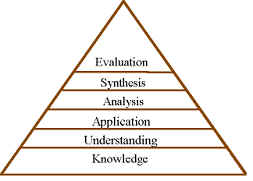Benjamin S. Bloom was born on 21 February 1913 in Lansford, Pennsylvania, and died on 13 September 1999. He received a bachelor’s and master’s degree from Pennsylvania State University in 1935 and a Ph.D. in Education from the University of Chicago in March 1942. He became a staff member of the Board of Examinations at the University of Chicago in 1940 and served in that capacity until 1943, at which time he became university examiner, a position he held until 1959. His initial appointment as an instructor in the Department of Education at the University of Chicago began in 1944 and he was eventually appointed Charles H. Swift Distinguished Service Professor in 1970. He served as educational adviser to the governments of Israel, India and numerous other nations. These are some of the facts pertaining to his life and career.
Bloom's Taxonomy
In 1956, Benjamin Bloom headed a group of educational psychologists who developed a classification of levels of intellectual behavior important in learning. Bloom found that over 95 % of the test questions students encounter require them to think only at the lowest possible level...the recall of information.
Bloom identified six levels within the cognitive domain, from the simple recall or recognition of facts, as the lowest level, through increasingly more complex and abstract mental levels, to the highest order which is classified as evaluation. Verb examples that represent intellectual activity on each level are listed here.
1. Knowledge: arrange, define, duplicate, label, list, memorize, name, order, recognize, relate, recall, repeat, reproduce state.
2. Comprehension: classify, describe, discuss, explain, express, identify, indicate, locate, recognize, report, restate, review, select, translate,
3. Application: apply, choose, demonstrate, dramatize, employ, illustrate, interpret, operate, practice, schedule, sketch, solve, use, write.
4. Analysis: analyze, appraise, calculate, categorize, compare, contrast, criticize, differentiate, discriminate, distinguish, examine, experiment, question, test.
5. Synthesis: arrange, assemble, collect, compose, construct, create, design, develop, formulate, manage, organize, plan, prepare, propose, set up, write.
6. Evaluation: appraise, argue, assess, attach, choose compare, defend estimate, judge, predict, rate, core, select, support, value, evaluate.
Bloom's Taxonomy
Competence |
Skills Demonstrated |
Question Cues: |
Knowledge |
·observation and recall of information
· knowledge of dates, events, places
· knowledge of major ideas
· mastery of subject matter
|
list, define, tell, describe, identify, show, label, collect, examine, tabulate, quote, name, who, when, where, etc. |
Comprehension |
·understanding information
·grasp meaning
·translate knowledge into new context
·interpret facts, compare, contrast
·order, group, infer causes
·predict consequences
|
summarize, describe, interpret, contrast, predict, associate, distinguish, estimate, differentiate, discuss, extend |
Application |
·use information
·use methods, concepts, theories in new situations
·solve problems using required skills or knowledge
|
apply, demonstrate, calculate, complete, illustrate, show, solve, examine, modify, relate, change, classify, experiment, discover |
Analysis |
·seeing patterns
·organizations of parts
·recognition of hidden meanings
·identification of components
|
analyze, separate, order, explain, connect, classify, arrange, divide, compare, select, explain, infer |
Synthesis |
·use old ideas to create new ones
·generalize from given facts
·relate knowledge from several areas
·predict, draw conclusions
|
combine, integrate, modify, rearrange, substitute, plan, create, design, invent, what if, compose, formulate, prepare, generalize, rewrite |
Evaluation |
·compare and discriminate between ideas
·assess value of theories, presentations
·make choices based on reasoned argument
·verify value of evidence
·recognize subjectivity
|
assess, decide, rank, grade, test, measure, recommend, convince, select, judge, explain, discriminate, support, conclude, compare, summarize |
|

